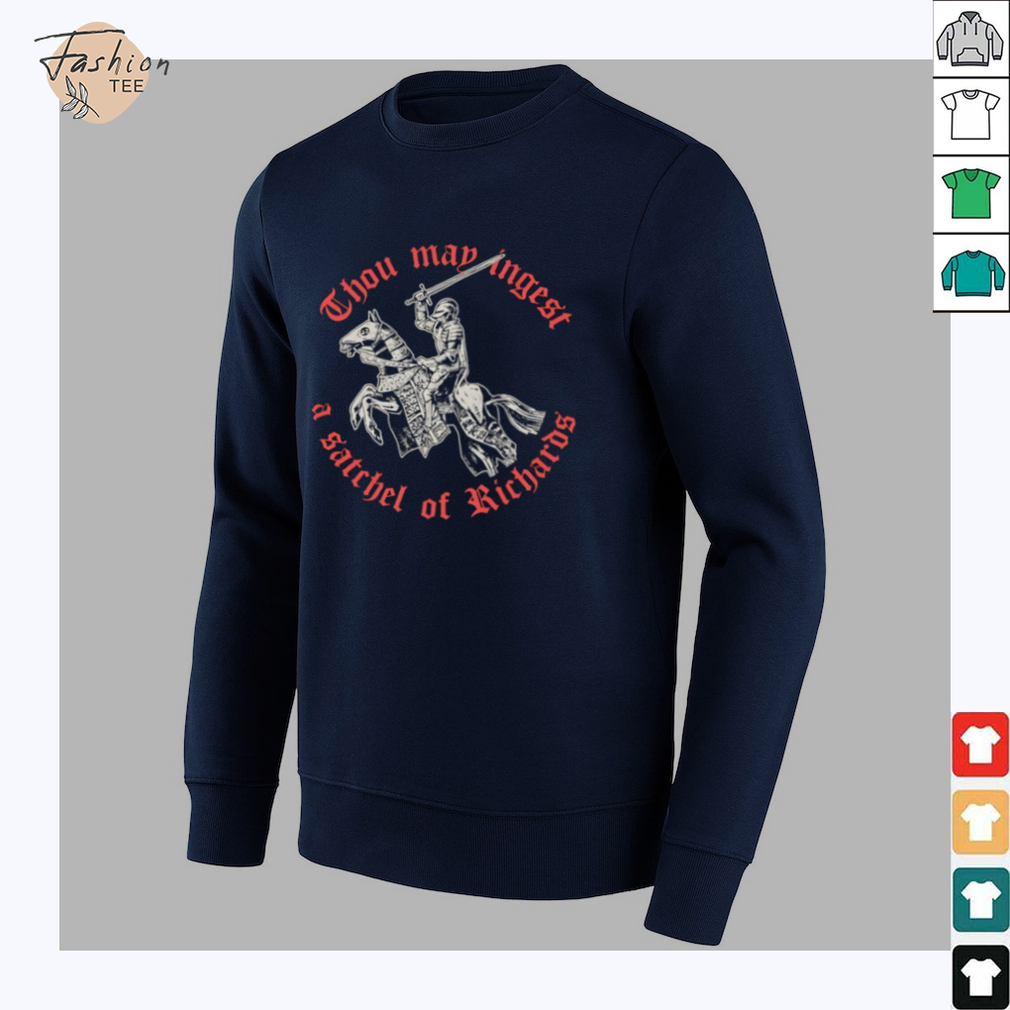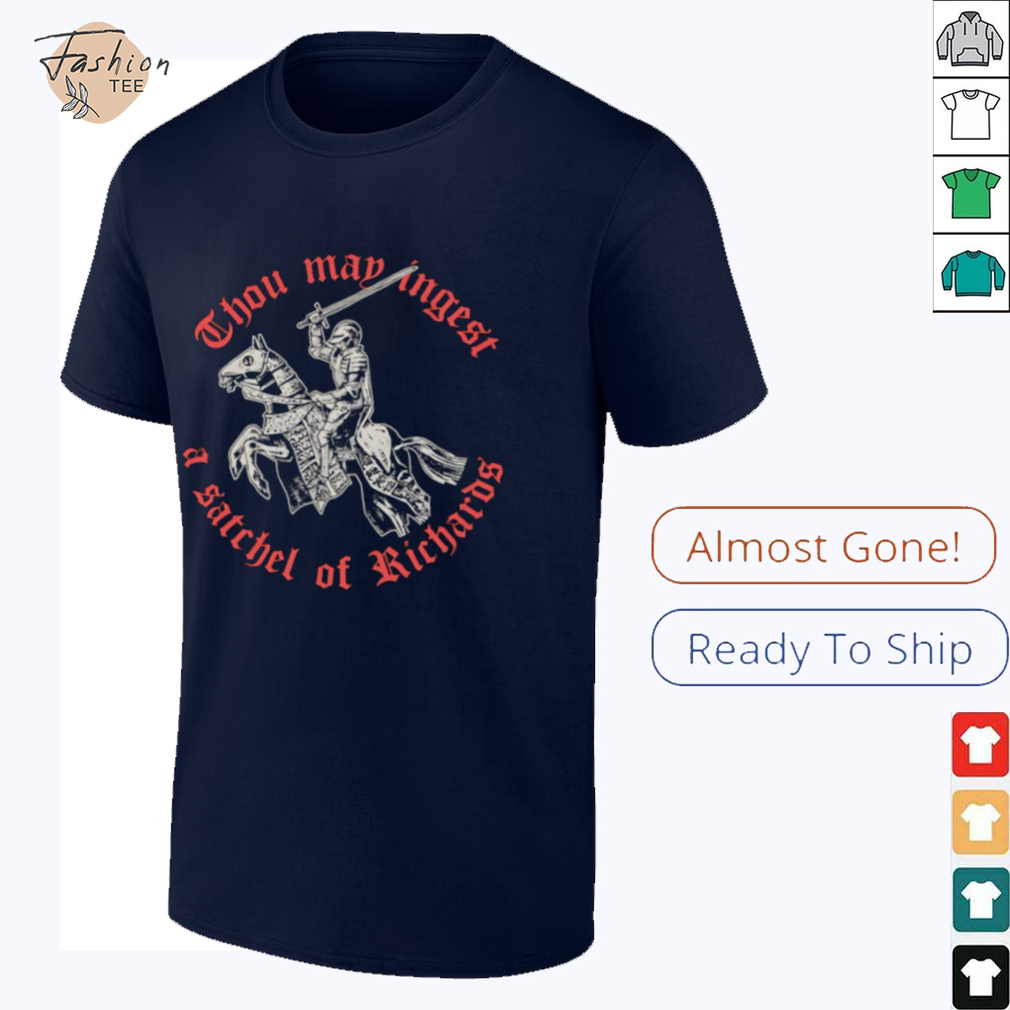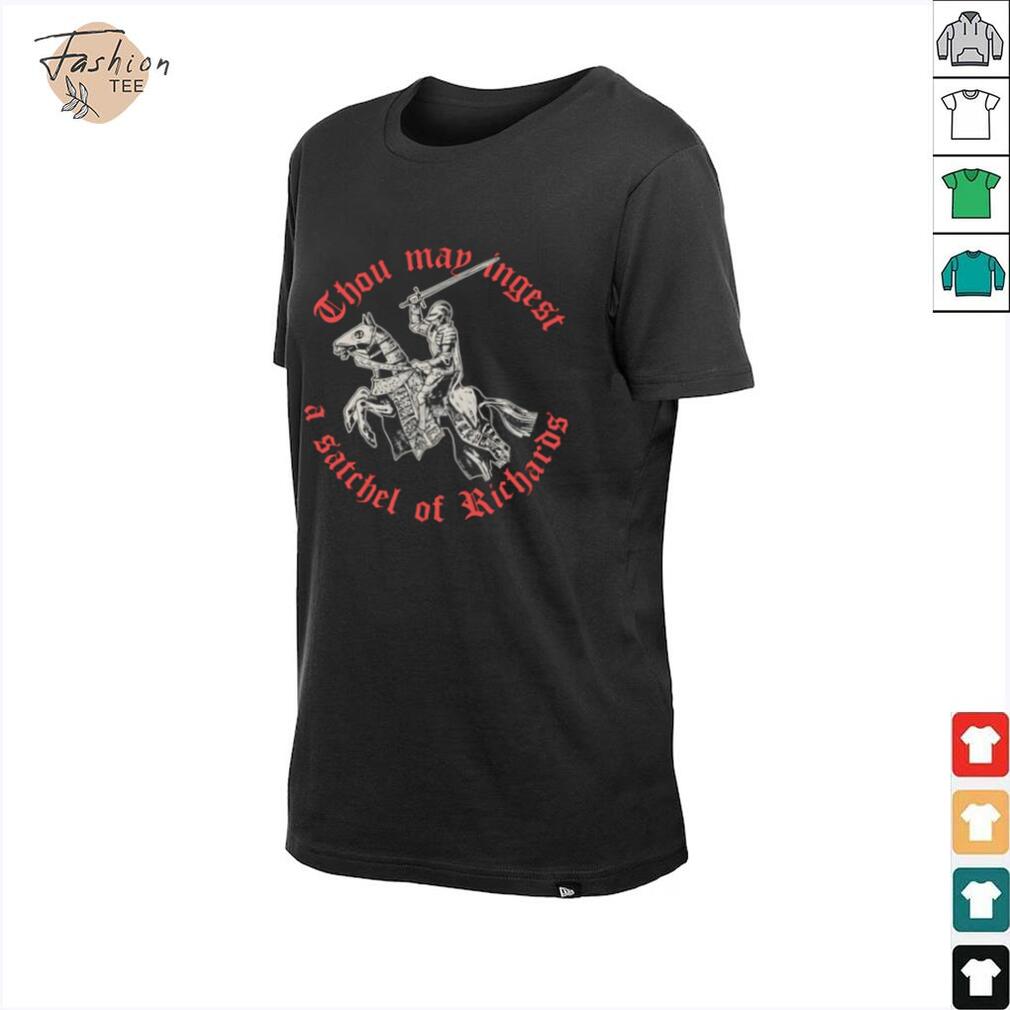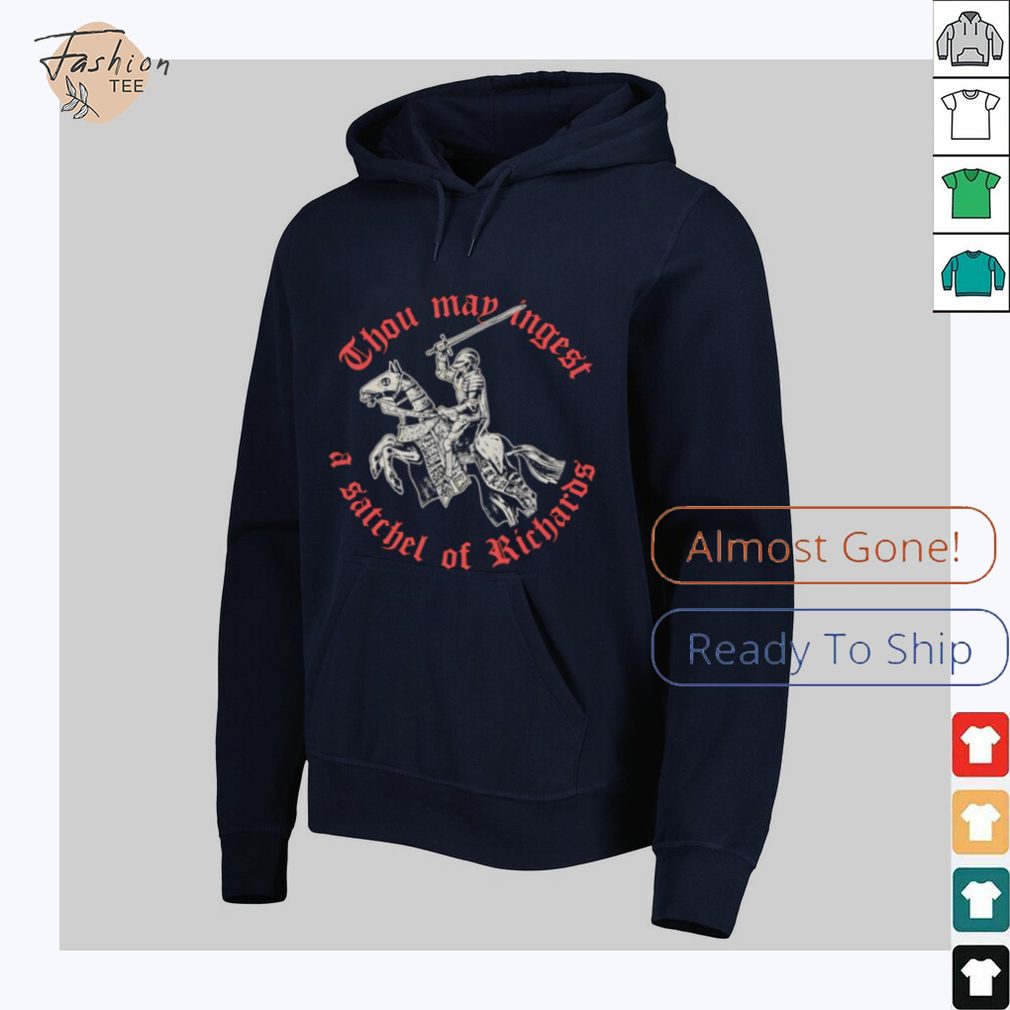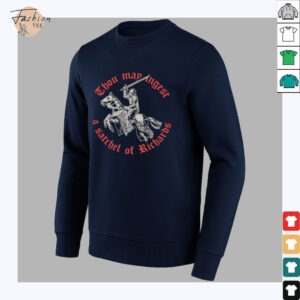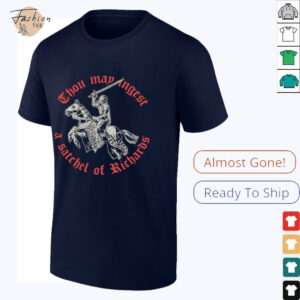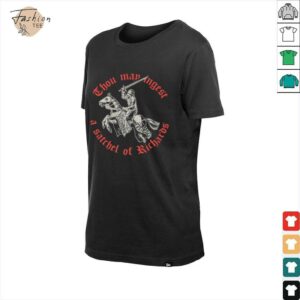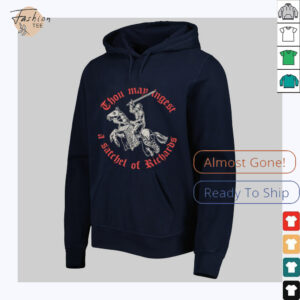“Thou May Ingest a Satchel of Richards Shirt”: Unleashing the Power of Playful Insults!
The “Thou May Ingest a Satchel of Richards Shirt” is a brilliant example of how modern humor can playfully appropriate archaic language to deliver a decidedly contemporary punch. This **T-shirt** features a phrase that, at first glance, might seem like a sophisticated, almost Shakespearean insult. However, a closer look (and a quick understanding of modern slang) reveals its true meaning: a clever, indirect, and often hilarious way to tell someone to “eat a bag of dicks.” It’s a statement piece designed for those who appreciate witty wordplay, a touch of sarcasm, and a dash of irreverent humor. For anyone who enjoys a good linguistic prank or wants to express their displeasure with a unique and memorable phrase that’s just “cryptic enough not to piss off everyone who sees it” (Etsy review), this **shirt** is an absolute must-have, blending old-world charm with a bold, adult-oriented message.
The prominent entity here is the clever, archaic-sounding phrase itself: “**Thou may ingest a satchel of Richards**.” The semantic keywords include “**satchel of Richards**” (a veiled reference to a vulgar phrase, often interpreted as “bag of dicks” – Redbubble, m00nshot.com), “**Thou**” (an archaic pronoun for “you”), “**ingest**” (to eat or consume), and “**Shirt**” (the product type). This phrase is a unique attribute in its deliberate use of formal, almost poetic language to convey a highly informal and rude sentiment. It’s a brilliant example of a **Shakespearean insult** that has been modernized for a viral effect (TikTok videos featuring explanations of the phrase have garnered hundreds of thousands of likes – TikTok @educatorandrea). My personal commentary is that this phrase is absolutely genius; it offers a sophisticated layer to what would otherwise be a crude insult, making it funnier and more unexpected. “But what happens next when you combine the elegance of Elizabethan English with the raw bluntness of modern slang, creating an insult that’s both intellectual and incredibly rude, and then put it on a shirt? It creates an instant conversation starter, a nod to those in the know, and a truly unforgettable piece of apparel that dares to be both clever and offensive.”
“Thou”: The Ancient Art of Insult Delivery
The use of “**Thou**” immediately transports the phrase to a bygone era, specifically evoking the formal and often dramatic language of Shakespearean times. In Old and Middle English, “thou” was the singular second-person pronoun, equivalent to “you” today, but its usage gradually declined, becoming associated with formality, intimacy, or, crucially, addressing inferiors or delivering solemn declarations – including insults (Merriam-Webster, Britannica). By starting with “**Thou**,” the **shirt** cleverly sets up a faux-archaic tone, making the unexpected modern vulgarity that follows even more impactful and humorous. It plays on our collective understanding of historical language as being inherently more dignified, only to subvert that expectation for comedic effect. This unique attribute leverages the power of linguistic incongruity, making the insult feel grander and more theatrical, while still delivering a clear, if hidden, message. It’s an intellectual twist on rude humor, appealing to those who appreciate a smart jab.
Scholarly articles and popular culture references frequently discuss the dramatic and often humorous impact of Shakespearean insults using archaic pronouns like “thou” (Scholastic’s “Shakespeare Insult Kit,” Merriam-Webster’s articles on Shakespearean wordplay). The enduring popularity of these historical linguistic quirks provides strong social proof for the effectiveness of this linguistic choice. My personal commentary is that there’s a certain joy in hearing a really well-crafted, old-fashioned insult; it feels like a lost art, and this shirt revives it beautifully. “Here’s the part they didn’t tell you: The shift from ‘thou’ to ‘you’ in English wasn’t just a matter of changing trends, but also a reflection of societal shifts towards more egalitarian forms of address, making its deliberate reintroduction here a subtle, yet effective, act of linguistic rebellion.”
“A Satchel of Richards”: The Hidden Meaning Unpacked
The core of this **T-shirt’s** humor lies in the phrase “**a satchel of Richards**.” While seemingly innocuous, “Richards” is a play on a common, informal pejorative for male anatomy (Urban Dictionary). Combined with “satchel” (a small bag), the phrase cleverly forms a euphemism for “a bag of dicks.” This indirectness is a unique attribute that makes the insult far more palatable and humorous in public settings, allowing the wearer to express a strong sentiment without resorting to overt profanity. It’s a linguistic wink to those who get the joke, creating an exclusive circle of understanding. The phrase has gained significant traction online precisely because of its clever obscurity, becoming a viral trigger among those who appreciate this type of adult humor (Reddit discussions, Etsy listings). This **shirt** is designed for individuals who enjoy sarcasm and subtle rebellion, delivering a bold message under the guise of pseudo-formality. If you like to zoom in this way on shirts that use clever double meanings to deliver a punchline, this design is a masterpiece of veiled vulgarity. It’s a statement for those who dare to be subtly provocative. For another product that speaks to a powerful individual achievement, albeit in a completely different context, consider the That’s 2000 Career Points for Kia Nurse Chicago Sky Shirt, which celebrates athletic excellence.
Online communities and merchandise platforms explicitly state the intended meaning of “satchel of Richards” as a humorous substitute for more explicit phrases, often noting its effectiveness in public (Redbubble, m00nshot.com). The phrase’s popularity on platforms like TikTok for its witty, less offensive delivery of a strong insult serves as social proof (TikTok @educatorandrea). My personal commentary is that the genius of this phrase is how it makes you pause, chuckle, and then realize the hidden meaning; it’s a journey from confusion to comedic revelation. “But what happens next when an obscure, yet deeply understood, slang phrase becomes a cultural touchstone, printed on shirts and shared across social media, becoming a universal, inside joke for those who appreciate its unique brand of humor? It creates a community of like-minded individuals and transforms a simple garment into a symbol of shared wit and playful defiance.”
The Shirt: Wearing Your Wit on Your Sleeve
The **Shirt** itself serves as the perfect canvas for this unique and humorous expression. By putting “Thou May Ingest a Satchel of Richards” on a **T-shirt**, the wearer transforms a personal sentiment into a public statement, inviting smiles, knowing glances, and perhaps even confused stares from those who haven’t yet deciphered its meaning. This choice of medium allows the phrase to travel, sparking conversations and spreading its distinctive brand of humor. The design, typically featuring a classic font that enhances the archaic feel, makes the text the focal point, ensuring the message is delivered clearly while still maintaining its subtle charm. It’s a bold yet non-confrontational way to express an attitude, making it a popular choice for casual wear, social gatherings, or as a witty gift. This **T-shirt** is more than just clothing; it’s a badge of humor, a conversation starter, and a testament to the power of a well-crafted, unconventional insult.
The widespread availability of this phrase on various merchandise platforms like Redbubble, Etsy, and dedicated humor apparel sites (Nerdy Shirts, PatchOps) highlights its commercial appeal and popular demand, providing strong social proof. Many sellers emphasize the shirt’s ability to generate laughs and reactions. My personal commentary is that wearing this shirt is like carrying a secret joke with you all day, and it’s incredibly satisfying when someone gets it. “But

